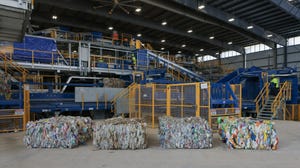Joining the Club 5512
Wisconsin joins other states mandating e-waste recycling.

In late October, Wisconsin Gov. Jim Doyle signed into law a bill requiring electronics manufacturers to arrange for the collection and recycling of devices such as video displays, computers and printers. Wisconsin is the 19th state to pass a law mandating the recycling of e-waste (New York City also implemented an e-waste recycling law in 2008).
The Wisconsin law requires electronics manufacturers to register with the state Department of Natural Resources (DNR) for an annual fee of $5,000 and mandates that manufacturers recycle 80 percent of the weight of covered electronic devices that they sell in the state. The law also calls for a ban on the landfill disposal and incineration of electronics to begin on July 1, 2010.
Manufacturers that don't meet their recycling requirement will have to pay a “shortfall fee.” On the other hand, those manufacturers that recycle more than is required will receive credits that they can either use to meet their requirements in following years or sell to other manufacturers for the same purpose.
Furthermore, the law mandates that electronics manufacturers disclose to the state whether their products comply with European Union limitations on the amount of hazardous substances such as lead and mercury.
“Wisconsin's electronics recycling law will help people throughout the state,” said Ann Coakley, director of DNR's Waste and Materials Management Program in a press release. “For consumers, the law will lead to more convenient drop-off locations for unwanted electronics. For recyclers and collectors, the law will provide new business. For retailers and manufacturers, the law will level the playing field by ensuring that all manufacturers are following the same recycling rules. For all state citizens, the law will ensure that covered electronics are recycled in a safe, responsible manner.”
According to a survey conducted by DNR in 2006, 80 percent of households in the state have at least one computer, while 99 percent have at least one television, and 85 percent have at least two televisions. Based on those numbers, DNR estimates that there are approximately 3.8 million computers and 7.5 million televisions in use in Wisconsin households.
In other landfill diversion news, a San Francisco law requiring all residences and commercial buildings to participate in the city's recycling and composting programs took effect in October. The law calls for residents and businesses to place their waste in one of three bins: one for trash, one for recyclables and one for compostable materials. Those placing waste in the wrong bin could be fined, but San Francisco Mayor Gavin Newsom has told media outlets that city officials will only levy such penalties for repeat and flagrant violations.
“While several other cities require recycling service and participation, San Francisco is the first city to require the collection of food scraps and other compostables,” said a press release from Newsom's office.
A study by the San Francisco's Department of the Environment found that 36 percent of the city's landfilled waste is compostable and 31 percent is recyclable. The department estimates that if all of that material were recovered, San Francisco's landfill diversion rate would increase to 90 percent.
The city, which has a current landfill diversion rate of 72 percent, has set the goals of a 75 percent rate by 2010 and a 100 percent rate by 2020.
Related Stories
About the Author(s)
You May Also Like




